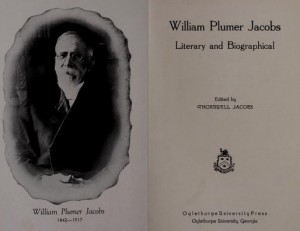Change is progress, progress is good!
April 2015

While researching an unrelated question recently, we found an interesting editorial written by Dr. William Plumer Jacobs, the founder of Thornwell Orphanage and Presbyterian College. The editorial was published sometime in 1910 in Our Monthly, later to be reprinted where it was discovered in the book William Plumer Jacobs: Literary and Biographical, edited by Dr. Jacobs’ son, Thornwell in 1942.
All of us have been witness to beneficial changes in our lifetimes. We thought you would enjoy considering the changes that were occurring in Laurens County, South Carolina 105 years ago.
1910 Editorial
A friend called for the writer [William Plumer Jacobs] recently and invited him to take an automobile ride, –a very common thing nowadays. In forty minutes we were enjoying the beautiful streets and views of beautiful homes of the city of Laurens some ten miles away and after some ten or fifteen minutes of sight seeing, in forty minutes more we were landed safely at our own doorstep.*
We had hardly reached home before there was a call at the telephone and a Columbia gentleman had an interview with us though some 70 miles separated us. The mail was brought in; among the letters was one from England, and another from Mexico, while a pamphlet from Paris was among the papers. A two cent stamp had brought both of them. To read the letters, a touch at the electric button flooded the room with light and by the same power the good daughter ran her sewing machine, or, had she wished it, pressed her clothing. Presently a ring was heard at the door and a telegram from far away Chicago was handed in; while marvel of marvels, the daily paper filled with news from all parts of the globe furnished food for conversation.
These are a few of the wonders of every day life. But they are the product of the mightiest forces of the human intellect. They are modern and miraculous enough to make us wonder at the age in which we live. When we sit down to think about what a foreign postage stamp means, –the unification of the world, we cannot but echo and re-echo the first telegram, “What hath God wrought.”**
*The same distance is now made in ten to fifteen minutes. [Note from the editor, Thornwell Jacobs, in 1942.]
**Archives note: On May 24, 1844, after convincing Congress to finance a Washington, DC to Baltimore telegraph line, Samuel Morse sent the first telegraph message, “What hath God wrought?”, from the Supreme Court chamber in the Capitol in Washington to Alfred Vail at the B & O Railroad Depot in Baltimore, Maryland. Just a decade after the first line opened, more than 20,000 miles of telegraph cable crossed the nation.
